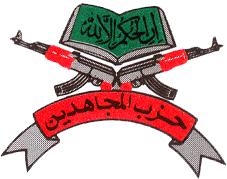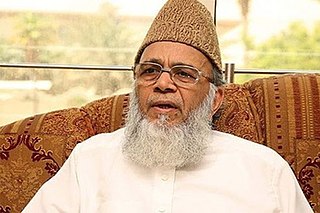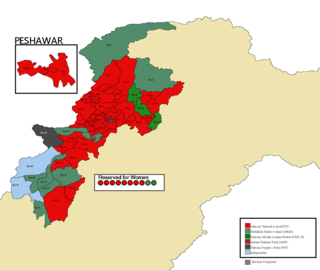
Jamaat-e-Islami, or Jamaat as it is commonly known, is an Islamist political party based in Pakistan and founded by Abul Ala Maududi. It is the Pakistani successor to Jamaat-e-Islami, which was founded in colonial India in 1941. Its objective is the transformation of Pakistan into an Islamic state, governed by Sharia law, through a gradual legal and political process. JI strongly opposes capitalism, communism, liberalism, and secularism as well as economic practices such as offering bank interest. JI is a 'vanguard party', whose members are intended to be leaders spreading party beliefs and influence. Supporters not thought qualified to be members may become 'affiliates', and beneath them are 'sympathizers'. The party leader is called an 'ameer'. Although it does not have a large popular following, the party is quite influential and considered one of the major Islamic movements in Pakistan, along with Deobandi and Barelvi.

Liaqat Baloch is a political leader in Pakistan.

Qazi Hussain Ahmad was an Islamic scholar, democracy activist, and former Emir of Jamaat-e-Islami, the socially conservative Islamist political party in Pakistan.

Hizbul Mujahideen, also spelled Hizb-ul-Mujahidin, is a Pakistan-affiliated Islamist militant organisation that has been engaged in the Kashmir insurgency since 1989. It aims to separate Kashmir from India and merge it with Pakistan, and is thus one of the most important players in the region as it evolved the narrative of the Kashmir conflict by steering the struggle away from nationalism and towards jihadism.

Israr Ahmad was a Pakistani Islamic scholar, orator and theologian, he developed a following in Pakistan and the rest of South Asia but also among some South Asian Muslims in the Middle East, Western Europe, and North America.

Tanzeem-e-Islami is an Islamic organisation that advocates the implementation of the Quran and Sunnah in the social, cultural, legal, political, and the economic spheres of life; and the "refutation of the misleading thoughts and philosophy of modernity".

Daily Jasarat is an Urdu Daily newspaper in Pakistan. It is circulated all over Pakistan with offices in Karachi, Lahore and Islamabad.

The Sipah-e-Sahaba (SS), also known as the Millat-e-Islamiyya (MI), is a Sunni Islamist banned Deobandi organisation in Pakistan. Founded by Pakistani cleric Haq Nawaz Jhangvi in 1989 after breaking away from Sunni Deobandi party Jamiat Ulema-e-Islam (F), it was based in Jhang, Punjab, but had offices in all of Pakistan's provinces and territories. It operated as a federal and provincial political party until it was banned and outlawed as a terrorist organization by Pakistani president Pervez Musharraf in 2002. Even though it has been banned by the Pakistani government on numerous occasions, the Sipah-e-Sahaba has continued to operate under a different name throughout the country; it has significant underground support in Punjab and Khyber Pakhtunkhwa. The organization was also banned by the United Kingdom, where there is a significant Pakistani diaspora population, in 2001.

Abul A'la al-Maududi was an Islamic scholar, Islamist ideologue, Muslim philosopher, jurist, historian, journalist, activist, and scholar active in British India and later, following the partition, in Pakistan. Described by Wilfred Cantwell Smith as "the most systematic thinker of modern Islam", his numerous works, which "covered a range of disciplines such as Qur'anic exegesis, hadith, law, philosophy, and history", were written in Urdu, but then translated into English, Arabic, Hindi, Bengali, Telugu, Tamil, Kannada, Burmese, Malayalam and many other languages. He sought to revive Islam, and to propagate what he understood to be "true Islam". He believed that Islam was essential for politics and that it was necessary to institute sharia and preserve Islamic culture similarly as to that during the reign of the Rashidun Caliphs and abandon immorality, from what he viewed as the evils of secularism, nationalism and socialism, which he understood to be the influence of Western imperialism.

Syed Munawar Hasan was a Pakistani politician who served as the 4th Emir of Jamaat-e-Islami from 2009 to 2014. He was elected as a member of the National Assembly of Pakistan from Karachi in 1977.

Siraj-ul-Haq is a Pakistani politician who was elected as the chief of Jamaat-e-Islami, a religious political party in Pakistan which seeks to establish an Islamic legal system. He also served as the Finance minister of Khyber Pakhtunkhwa twice; first in the cabinet of Chief Minister Akram Khan Durrani, from 2002-2007, and again minister during Pervez Khattak's tenure as Chief Minister.
Jamaat-e-Islami is an Islamist fundamentalist movement founded in 1941 in British India by the Islamist author, theorist, and socio-political philosopher, Syed Abul Ala Maududi, who was inspired by the Muslim Brotherhood. It is considered one of the most influential Islamist organisations, and was the first to develop an ideology based on the modern revolutionary conception of Islam. Its founding branch in Pakistan is the nation's largest fundamentalist party.
The Difa-e-Pakistan Council is an umbrella coalition of more than 40 Pakistani Political and Religious parties that advocated conservative policies such as closing NATO supply routes to Afghanistan and rejects granting India most-favored nation status.
Events in the year 2013 in Pakistan.
Maulana Naeem Siddiqui was a Pakistani Islamic scholar, writer and politician. He was among the founder-members of the Jamaat-e-Islami and a close associate of Abul A'la Maududi and Amin Ahsan Islahi.

Islami Jamiat-e-Talabaabbr.IJT is the largest student organization in Pakistan. It was founded by 25 students on 23 December 1947 at Lahore, Pakistan. Islami Jamiat-e-Talaba is working in Pakistan to eliminate the non-Islamic elements and secularism from the curriculum and teachings of the educational institutions of Pakistan. It is a member of the International Islamic Federation of Student Organizations and the World Assembly of Muslim Youth.
Izazul Mulk is a Pakistani politician from Lower Dir District, belonging to Jamaat-e-Islami Pakistan, who served as a member of the Khyber Pakhtunkhwa Assembly. He also served as a member of various committees.
Syed Waseem Akhtar was a Pakistani politician who had been a Member of the Provincial Assembly of the Punjab, between 1990 and May 2018.
Abdul Ghaffar Aziz was a Pakistani politician, Islamic scholar and deputy emir of Jamaat-e-Islami Pakistan from April 2019 to 5 October 2020 until his death. He was also Director of Foreign Affairs of JI for over two decades.

General elections were held in Khyber Pakhtunkhwa on Wednesday, 25 July 2018 to elect the 51 members of 15th National Assembly from Khyber Pakhtunkhwa. The Pakistan Tehreek-e-Insaf (PTI) obtained a landslide victory in the province by winning 37 general seats and increased their margin of victory from 2013. The PTI also won 8 out of 10 reserved seats while the Pakistan Muslim League (N) (PML-N) and Muttahida Majlis-e-Amal (MMA) won 1 reserved seat each.












